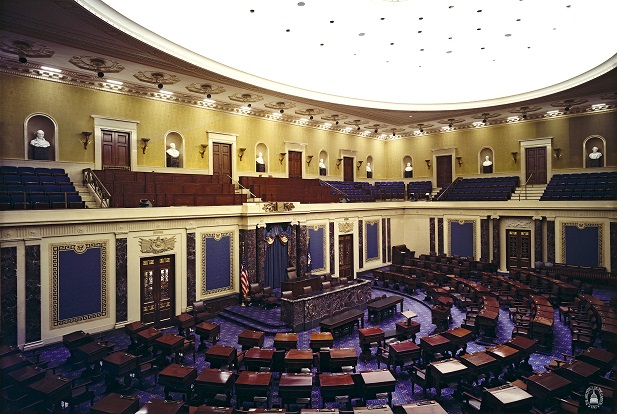 U.S. Senate Chamber. (Photo: Architect of the Capitol.)
U.S. Senate Chamber. (Photo: Architect of the Capitol.)
The final version of the Coronavirus Aid, Relief, and Economic Security, or CARES Act, that emerged from the Senate and is now being considered in the House of Representatives includes relief for loans and hardship distributions from defined contribution plans and IRAs. It also includes a temporary waiver of scheduled required minimum distributions from qualified retirement plans for the year of 2020. Here are more provisions you need to know about:
- Hardship distributions related directly to the coronavirus pandemic are allowed up to $100,000, with a waiver of the 10 percent penalty for the distributions.
- Standard plan loans can be made up to $100,000. The 10 percent penalty is also waived on plan loans. Taxes on the distributions and loans can be paid over three years.
- Those who have been diagnosed with the coronavirus, or have a spouse or dependent diagnosed, will be eligible for the hardship distributions and loans.
- So too will anyone who is experiencing what the bill calls "adverse financial consequences" from the pandemic. Sponsors of defined contribution plans can rely on certifications from plan participants that they are eligible to tap their savings.
The provisions on hardship distributions and loans will add $2.6 billion to the federal debt over the 10-year budget window, according to a score of the bill by the Joint Committee on Taxation.
The temporary wavier on RMDs for the calendar year 2020 will mean $10.6 billion in lost revenue to the federal government, the JCT's score says.
Contributions to single-employer DB plan delayed
Sponsors of single-employer defined benefit plans can delay scheduled minimum contributions for 2020 to January 1, 2021. Interest will be owed on the delayed contributions, which accrues at the effective rate of interest used for plan year 2020.
A provision of the bill extends non-profit pension rules to non-profit providers of child care.
The CARES Act gives the Labor Department, and the Employee Benefits Security Administration, wide authority to delay filing requirements under the Employee Retirement Income Security Act. Such latitude was previously only available in times of war or when the country is under attack from terrorists.
Employer share of payroll tax delayed
Employers will not have to pay their share of the payroll tax from the time of the bill's enactment until the end of 2020. Those taxes will ultimately have to be repaid—half by the end of 2021, the other half by the end of 2022.
That provision will add another $12 billion the federal debt over the 10-year budget window.
The House is scheduled to bring the CARES Act to a vote on Friday, March 27. The JCT's score assumes enactment of the bill on April 1.
© 2025 ALM Global, LLC, All Rights Reserved. Request academic re-use from www.copyright.com. All other uses, submit a request to [email protected]. For more information visit Asset & Logo Licensing.








